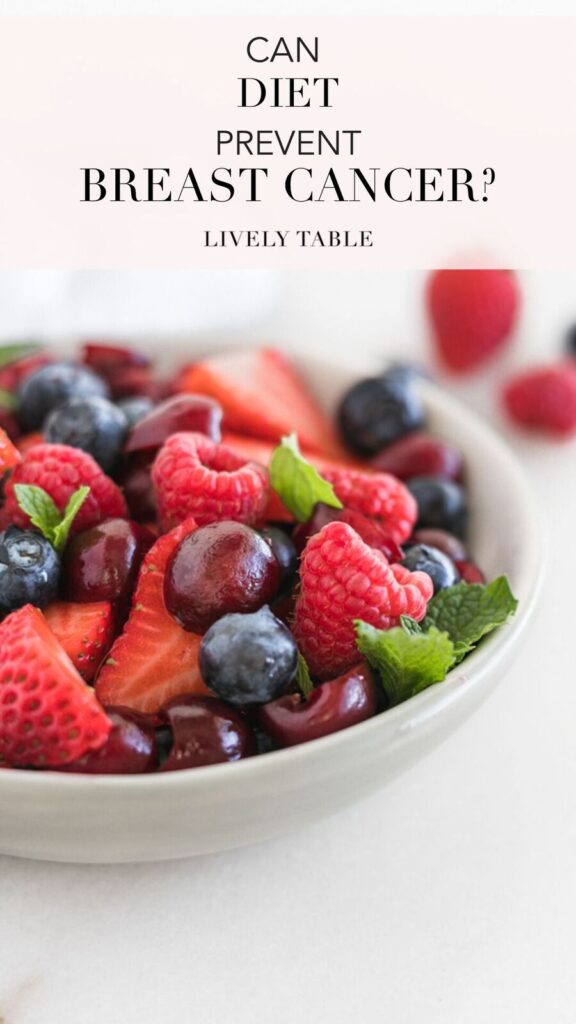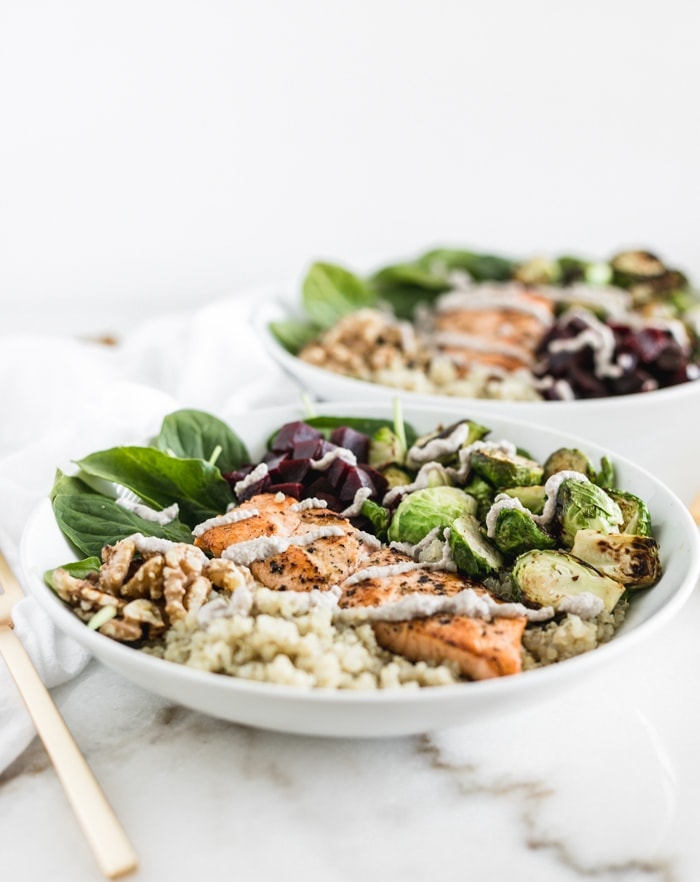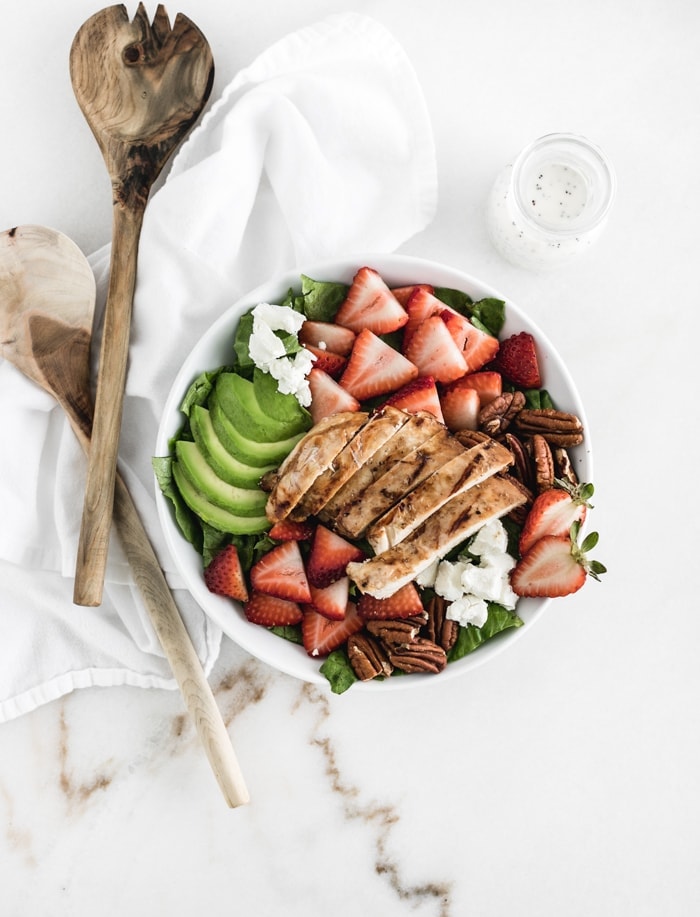Can eating a healthy diet prevent breast cancer? Is there a good diet for breast cancer prevention? Here's what the latest research says about nutrition for breast cancer prevention from a dietitian.

This post was originally published in October of 2015. It has been updated to reflect the most recent research.
Breast cancer is a subject near and dear to my heart. My mom has been a survivor for over 10 years, and just a few years ago, I found out that I was positive for the BRCA1 gene mutation, putting my risk for developing breast cancer at some point in my life at 60-80%. (Read more about that here.)
While genetics an other uncontrollable factors do play a role in breast cancer and other cancers, there are other modifiable factors when it comes to cancer prevention, and many of them have to do with lifestyle - that is, diet, exercise, sleep, tobacco and alcohol use, and stress1. We already know that smoking definitely increases the risk of many forms of cancer and that getting adequate exercise reduces the risk of cancer. There is also mounting evidence that managing stress and getting enough sleep may play important roles in reducing the risk of cancer. So what about diet?
Can diet prevent breast cancer?
The short answer: kind of.
I know, not sexy. But research, especially nutrition research, is very complicated. The truth is, studying nutrition in freely living humans is really difficult, making it hard to draw solid conclusions. We have plenty of epidemiological data, but that doesn't necessarily establish cause and effect. Well designed clinical trials (which is ideally what you want) that are strong, reproducible and conducted in a controlled setting are very expensive and difficult to conduct. And when it comes to chronic diseases like cancer that take decades to develop, clinical trials may not be conducted long enough to come up with a result. Furthermore, there are so many confounding variables when it comes to cancer development - race, age, menopause, number of pregnancies (and whether or not the woman nurses), as well as other lifestyle factors, that it can be very difficult to pinpoint which nutritional factors affect cancer development.
That said, there is some decent evidence regarding diet and breast cancer. So let's dig in!
What type of diet is best for breast cancer prevention?
Diet and nutrition are never one-size-fits-all. Humans are different and certain foods can affect people differently. That said, a dietary pattern consistent with the Mediterranean Diet (which also good for many aspects of health, from heart health to reproductive health) has recently been found to be protective against breast cancer as well.2 The Mediterranean Diet is also associated with lower total cancer mortality and lower all-cause mortality in people who have breast cancer.3
The Mediterranean dietary pattern consists of a daily intake heavy in plant foods - vegetables, fruit, whole grains, beans, nuts, and healthy fats such as olive oil. Seafood is encouraged as a protein source, with moderate intake of dairy, eggs, and poultry, while red meats, sweets, and highly refined and processed foods are to be enjoyed infrequently. This is consistent with previous recommendations to increase fruit and vegetable intake and reduce red and processed meats for all types of cancer prevention.
Translation: Following a Mediterranean-style diet is good for both prevention and survival after a cancer diagnosis, as well as in general. Eat lots of plant foods, seafood, and healthy fats. Reduce red meat and highly processed foods.
Vegetable and Fruit Intake and Cancer Prevention
We all know we should eat more fruits and vegetables. Researchers have a hard time producing a clear link between fruit and vegetable intake and cancer and a specific dose due to factors I mentioned earlier, but they're getting closer. Vegetable intake especially appears to be helpful in preventing estrogen receptor negative tumors.4 There are several reasons that vegetables and fruit are important in a cancer prevention diet.5 For one thing, they're high in fiber, which could bind oestrogens and reduce their absorption. Vegetables and fruit are also important sources of phytochemicals including flavonoids, carotenoids, ellagic acid, and glucosinolates, all of which have different possible mechanisms for protecting against cancer - reducing inflammation, neutralizing free radicals, reducing oxidative stress, even changing the epigenome and promoting death of cancer cells. Different phytochemicals are found in different types of plant foods (many times signaled by different colors), which is why it's important to eat a variety of vegetables and fruits daily.
Translation: Eat a variety of fruits and vegetables every day. Especially vegetables. Cruciferous veggies (like broccoli, cauliflower, cabbage and brussels sprouts) appear to be especially protective against breast cancer.6 Aim for a minimum of 5 servings per day of vegetables and fruits daily.
Soy and Breast Cancer
It was once thought that soy foods could have a negative impact on breast cancer because they contain isoflavones, which have similar chemical structure to estrogen. However, recent research shows that soy is not only safe, but could be preventative when it comes to breast cancer.7
Translation: It is safe and potentially beneficial to include minimally processed forms of soy, including soybeans (edamame), tofu, tempeh, and soymilk. Isoflavone supplements are not recommended.
Alcohol and Breast Cancer
While you may have heard that alcohol is good for longevity, that's not the case when it comes to breast cancer. The evidence is pretty clear here, and unfortunately for those of us who like to unwind with a glass of wine at night, alcohol does increase the risk for breast cancer, as well as recurrence in survivors. If you do choose to drink, limit consumption to no more than 3-4 standard drinks per week, and not in the same day.5
Translation: Drinking alcohol is not recommended for breast cancer prevention. If you choose to drink, do so in moderation (3-4 drinks per week).
Red Meat and Breast Cancer
Studies on red meat intake and breast cancer have inconsistent results. Some recent studies show associations between red meat and increased breast cancer risk, possibly due to added nitrates and heme iron in processed meats.8 A recent study also showed that swapping red meat for poultry could lower breast cancer risk.9
Translation: Enjoy red meat in moderation (about once a week) choosing fresh cuts such as steaks, ground beef, and roasts, and avoiding highly processed meat.
Fats and Breast Cancer
Old school thinking was that a low-fat diet was helpful for breast cancer. Not so much anymore. Now we know that it's the type of fat the matters. High intake of omega-3 fatty acids relative to omega-6 fatty acids is associated with a reduced risk of breast cancer, as well as a reduced risk of recurrence in survivors. EPA and DHA (found in fish sources) are especially helpful.10
Recently, walnuts, another source of healthy omega-3 fatty acids, have also been found to possibly suppress growth and survival of breast tumors.11 You can read more about the study in this post. Besides fatty fish and walnuts, other sources of omega-3 fatty acids include chia seeds, flax seeds, and hemp seeds, algae, and soybeans.
Translation: Pay attention to the type of fat you're eating. Increase omega-3 fatty acids from fish, nuts, and seeds, and reduce saturated fat (found in animal products, fried foods, and highly processed foods.
A quick note on supplements and breast cancer:
Supplementing antioxidants (such as vitamin E, selenium, and vitamin A) may do more harm than good when it comes to breast cancer, so I'd recommend avoiding them. Supplementing fish oil for omega-3s appears safe and even beneficial.3,10
Basically, what it all boils down to is maintaining a relatively healthy eating pattern long-term that includes lots of plant foods (vegetables, fruit, nuts, whole grains, beans), seafood, healthy fats like olive oil, and moderate lean protein and dairy foods, while limiting highly refined foods, sweets, alcohol, and processed red meats. Does that mean you have to give up these 'fun foods' for good? Not at all! Life is nothing without a good steak, a piece of wedding cake, or a glass of wine. Just be mindful about enjoying these foods less often and incorporating a more healthy eating pattern overall.
What questions do you have about breast cancer and nutrition? I'd love to help answer them in the comments!
Resources:
- https://www.pcf.org/guide/wellness-guide-inf/
- https://jamanetwork.com/journals/jamaoncology/article-abstract/2482911
- https://www.karger.com/Article/FullText/488718
- https://academic.oup.com/ajcn/article/103/1/168/4569293
- https://www.ncbi.nlm.nih.gov/pmc/articles/PMC4531134/
- https://jamanetwork.com/journals/jama/article-abstract/1031379
- https://www.ncbi.nlm.nih.gov/pmc/articles/PMC2981011/
- https://www.ncbi.nlm.nih.gov/pubmed/26505173
- https://onlinelibrary.wiley.com/doi/abs/10.1002/ijc.32547
- https://breast-cancer-research.biomedcentral.com/articles/10.1186/s13058-015-0571-6
- https://www.sciencedirect.com/science/article/pii/S0271531718311904?via%3Dihub




Leave a Reply